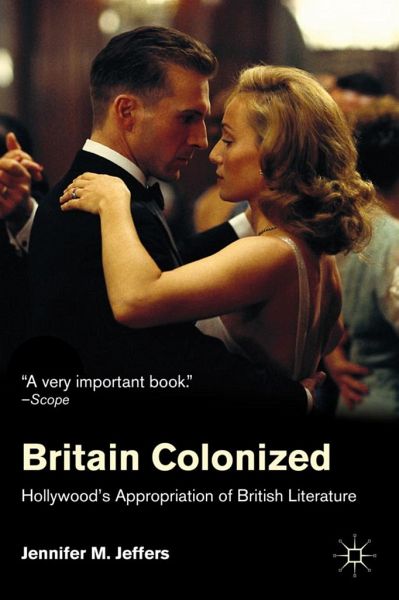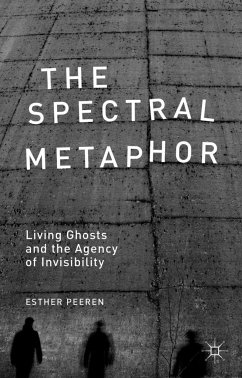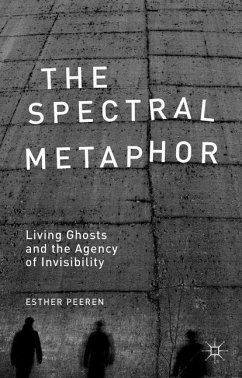
Jennifer M. Jeffers
Broschiertes Buch
Britain Colonized
Hollywood's Appropriation of British Literature
Versandkostenfrei!
Versandfertig in über 4 Wochen

PAYBACK Punkte
26 °P sammeln!





This study explores Hollywood's invention of Britain through the adaptation of its literature. Utilizing Derrida's Margins of Philosophy , texts by Gilles Deleuze and his work with Felix Guattari, this text identifies the future of British and Anglophone literary and cultural studies as a group of citations appropriated for American ends.
JENNIFER M. JEFFERS is Associate Professor of English, Cleveland State University, USA.
Produktdetails
- Verlag: Palgrave Macmillan / Palgrave Macmillan US / Springer Palgrave Macmillan
- Artikelnr. des Verlages: 978-0-230-12099-0
- 2006 edition
- Seitenzahl: 282
- Erscheinungstermin: 6. Februar 2012
- Englisch
- Abmessung: 225mm x 144mm x 25mm
- Gewicht: 353g
- ISBN-13: 9780230120990
- ISBN-10: 0230120997
- Artikelnr.: 33723088
Herstellerkennzeichnung
Libri GmbH
Europaallee 1
36244 Bad Hersfeld
gpsr@libri.de
'A vital addition to the literature on the growing fields of visual rhetoric, transatlantic studies, and cultural studies.' - CHOICE
"Britain Colonized is a very important book for film adaptation studies. In reframing how film adaptations work, reconcile their artistic duties with economic considerations, and differ when appropriated in different national contexts, Jeffers has provided scholars with new map for how to study literature on screen." Scope
'Jeffers offers convincing analyses of how and why certain texts have been transformed by Hollywood adapters, and she tenders convincing suggestions about how such adaptations are consumed in contemporary classrooms . . . I found this book disturbingly perceptive and
"Britain Colonized is a very important book for film adaptation studies. In reframing how film adaptations work, reconcile their artistic duties with economic considerations, and differ when appropriated in different national contexts, Jeffers has provided scholars with new map for how to study literature on screen." Scope
'Jeffers offers convincing analyses of how and why certain texts have been transformed by Hollywood adapters, and she tenders convincing suggestions about how such adaptations are consumed in contemporary classrooms . . . I found this book disturbingly perceptive and
Mehr anzeigen
original. It deserves to be taken seriously." - Journal of American Cultures
'From the unreadable to the hip: the movement of culture from a space of challenge, on the outskirts of sense, into the predigested phenomenon of an attitude, is one of the many aspects of the trajectory of literary adaptation so effectively documented in Britain Colonized.' - Modern Fiction Studies
"Britain Colonized is a very important book for film adaptation studies. In reframing how film adaptations work, reconcile their artistic duties with economic considerations, and differ when appropriated in different national contexts, Jeffers has provided scholars with new map for how to study literature on screen." - Scope"Jeffers has taken a significant step toward rectifying this scholarly lacuna in Britain Colonized: Hollywoods Appropriation of British Literature, which focuses on a relatively brief but vitally important stage of Hollywood's long-standing, deep-seated "Brit-Lit" obsession, spanning the early 1990s to the early 2000s. The book is important too as a contribution to adaptation studies, generally, although as Jeffers readily acknowledges, Hollywood's exploitation of British literature has been altogether unique in the annals of commercial films and filmmaking....We may agree to situate Booker Prize novels in a rarified realm beyond the "culture industry," but what are we to do with the work of Tolkien and C.S. Lewis and (heaven forbid) J.K. Rowling? This is no minor quibble, finally, but a crucial concern that cuts to the very core of Jeffers's argument and of adaptation studies generallyIndeed, it engenders a debate that Jennifer Jeffers's Britain Colonized brilliantly provokes, and one that literary and film scholars would do well to pursue." - Thomas Schatz, The University of Texas at Austin
"The idea that British literature could be "colonized" for American viewing is intriguing, and the way that concept is carried off is a compelling one. Jeffers treats colonization-national/racial/cultural superiority and American hegemony, which are crucial issues, since American films now enjoy an audience that is international. Thus, Jeffers gives flesh to the idea that in promoting American films we are also promoting America's sense of superiority." - Todd May, Clemson University
"Divided by an ocean yet bound by history and language, Britain and America have engaged for centuries in a dance around the question of territory. Jeffers' book articulates one crucial moment of this dance by connecting "territory" to the visual image that has the power to re-articulate it. Her argument - that American film returns the postcard to its sender, colonizing the colonizer - is an important contribution to critical theories dealing with one nation's remaking of another and the shadows such remakings cast on the very concept of a historical future." - Helen Regueiro Elam, University at Albany
'From the unreadable to the hip: the movement of culture from a space of challenge, on the outskirts of sense, into the predigested phenomenon of an attitude, is one of the many aspects of the trajectory of literary adaptation so effectively documented in Britain Colonized.' - Modern Fiction Studies
"Britain Colonized is a very important book for film adaptation studies. In reframing how film adaptations work, reconcile their artistic duties with economic considerations, and differ when appropriated in different national contexts, Jeffers has provided scholars with new map for how to study literature on screen." - Scope"Jeffers has taken a significant step toward rectifying this scholarly lacuna in Britain Colonized: Hollywoods Appropriation of British Literature, which focuses on a relatively brief but vitally important stage of Hollywood's long-standing, deep-seated "Brit-Lit" obsession, spanning the early 1990s to the early 2000s. The book is important too as a contribution to adaptation studies, generally, although as Jeffers readily acknowledges, Hollywood's exploitation of British literature has been altogether unique in the annals of commercial films and filmmaking....We may agree to situate Booker Prize novels in a rarified realm beyond the "culture industry," but what are we to do with the work of Tolkien and C.S. Lewis and (heaven forbid) J.K. Rowling? This is no minor quibble, finally, but a crucial concern that cuts to the very core of Jeffers's argument and of adaptation studies generallyIndeed, it engenders a debate that Jennifer Jeffers's Britain Colonized brilliantly provokes, and one that literary and film scholars would do well to pursue." - Thomas Schatz, The University of Texas at Austin
"The idea that British literature could be "colonized" for American viewing is intriguing, and the way that concept is carried off is a compelling one. Jeffers treats colonization-national/racial/cultural superiority and American hegemony, which are crucial issues, since American films now enjoy an audience that is international. Thus, Jeffers gives flesh to the idea that in promoting American films we are also promoting America's sense of superiority." - Todd May, Clemson University
"Divided by an ocean yet bound by history and language, Britain and America have engaged for centuries in a dance around the question of territory. Jeffers' book articulates one crucial moment of this dance by connecting "territory" to the visual image that has the power to re-articulate it. Her argument - that American film returns the postcard to its sender, colonizing the colonizer - is an important contribution to critical theories dealing with one nation's remaking of another and the shadows such remakings cast on the very concept of a historical future." - Helen Regueiro Elam, University at Albany
Schließen
Für dieses Produkt wurde noch keine Bewertung abgegeben. Wir würden uns sehr freuen, wenn du die erste Bewertung schreibst!
Eine Bewertung schreiben
Eine Bewertung schreiben
Andere Kunden interessierten sich für













